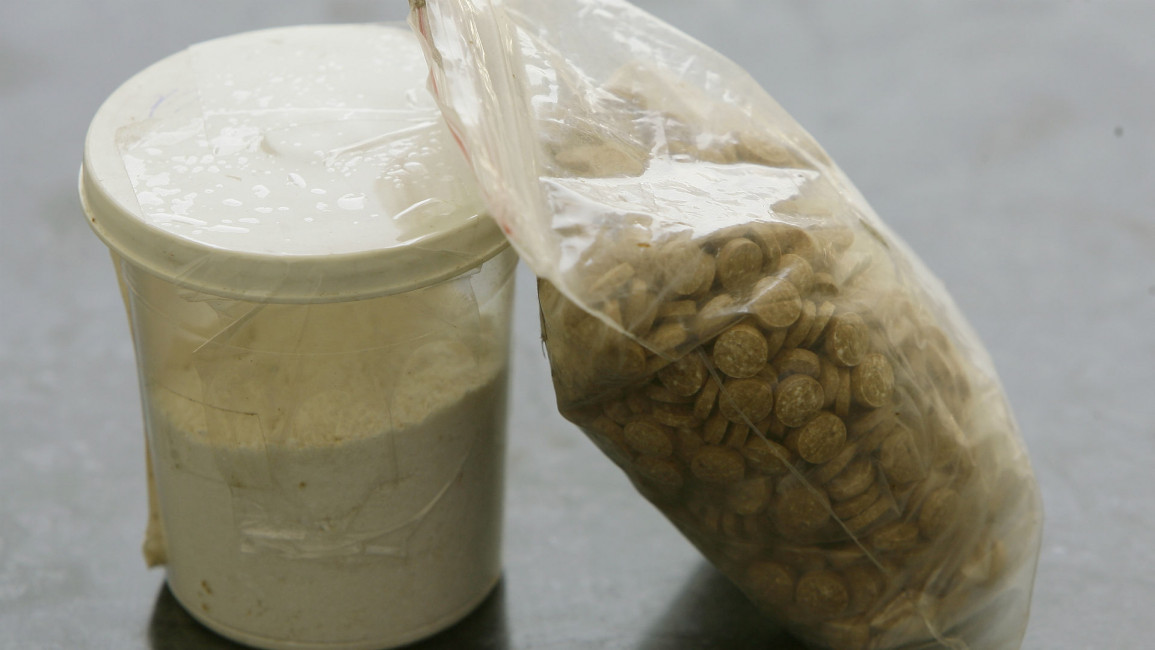Italy claims IS behind amphetamines smuggling ring, but analysts point to the Syrian regime
Italy claims IS behind amphetamines smuggling ring, but analysts point to the Syrian regime
Rome blamed IS for being the culprit in the 'biggest seizure of amphetamines in the world', but analysts have blamed the Syrian regime.
3 min read
Saudi Arabia is the world's largest consumer of Captagon [Getty]
Italian police on Wednesday said they had seized a world record haul of amphetamines, blaming the Islamic State group for the production and trafficking of the 14 tonnes of alleged Captagon tablets.
Syria experts have since countered those claims, claiming that the lucrative amphetamines trade in the region is more associated with the Syrian regime and its ally, Lebanese militant group Hezbollah, than IS, whose members are currently holed up in remote hideouts.
"Captagon production in Syria is prolific, but it's not [IS] manufacturing it at scale and exporting it to the EU (though [IS] did consume it in the past)," Emma Beals, editor of Syria in Context, said in a tweet.
Militants on all sides of the conflict have been accused of using the stimulant to keep fighters alert, but there is an obvious culprit in the production of the drug.
IS "absolutely lacks the facilities or logistics for such an operation", added Tobias Schneider, research fellow at the Global Public Policy Institute (GPPi).
Schneider's statement was echoed by several other Syrian-focused analysts and journalists, including reporter Sam Dagher and researcher Elizabeth Tsurkov.
"They're living in caves, mountain hideouts and underground in Syria and Iraq. The actors in Syria actually producing Captagon are mostly linked to the 4th Division of the Syrian Army," said Tsurkov, a fellow at the Foreign Policy Research Institute, referring to the army division headed by Maher al-Assad, a brother of the Syrian dictator.
IS lost its last territorial stronghold in Syria more than a year ago. Since then, the IS presence in Syria is reportedly limited to sleeper cells and small groups hidden in the country's vast eastern desert.
Trafficking routes
Fenethylline, widely known by its brand name Captagon, is perhaps the most popular narcotic drug in the Middle East region.
Syria is the reported global hub of Captagon production, and drug busts across the region in recent years tell a story of where the drug is trafficked from.
|
|
The illicit drug appears to travel through areas of Syria that are controlled by the Assad regime and staunch ally Hezbollah, which is based in neighbouring Lebanon.
"The big Captagon factories inside Syria, based south of Homs, as well as the main export routes, are controlled by the Hezbollah-Assad connection," Schneider said in a tweet.
"There have been a number of big Captagon busts across the region in recent months. Some can be traced pretty clearly to Maher-Makhlouf factories, shipped via Iranian and Hezbollah-controlled ports," he added, referring to Rami Makhlouf, the cousin of Syrian leader Bashar al-Assad.
In April, Saudi customs officials seized more than 40 million Captagon pills. This particular bust provided an even more clear link to the Syrian regime, as the stimulants were hidden in containers with tea packaging made by a company with close ties to the Assad family.
In recent years, Lebanon has stopped multiple shipments of the drug passing through the country on the way to the Gulf states. Saudi Arabia is the world's largest consumer of Captagon.
"Evidence strongly indicates that Hezbollah and their associated Syrian military connections are responsible for the increase in Syria's Captagon production and distribution," according to a 2016 article in Columbia University's Journal of International Affairs.
Several recent busts have also been shown to originate from Syria's main port city Latakia, which is controlled by the Assad regime.
Follow us on Facebook, Twitter and Instagram to stay connected


![Minnesota Tim Walz is working to court Muslim voters. [Getty]](/sites/default/files/styles/image_684x385/public/2169747529.jpeg?h=a5f2f23a&itok=b63Wif2V)




![Debris near Rafic Hariri International Airport [Getty]](/sites/default/files/styles/image_212x120/public/2176162423.jpeg?h=a5f2f23a&itok=XLiO6WHk)
![An Israeli air strike on Jabalia killed teenage journalist Hassan Hamad [Screengrab/X]](/sites/default/files/styles/image_330x185/public/2024-10/hassan%20hamad1.jpg?h=c12e0b96&itok=Rd_dyCVp)
